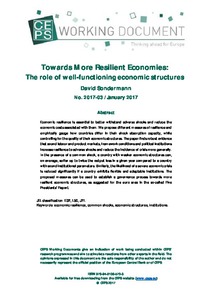Towards more resilient economies: the role of well-functioning economic structures
"Economic resilience is essential to withstand adverse shocks and reduce the economic costs associated with them, argues the author of this CEPS Working Document. He proposes different measures of resilience and gauges how countries differ in their shock absorption capacity, while controlling f...
| Main Author: | |
|---|---|
| Institution: | ETUI-European Trade Union Institute |
| Format: | TEXT |
| Language: | English |
| Published: |
Brussels
2017
CEPS |
| Subjects: | |
| Online Access: | https://www.labourline.org/KENTIKA-767712458599-Towards-more-resilient-economi.htm |
| Summary: | "Economic resilience is essential to withstand adverse shocks and reduce the economic costs associated with them, argues the author of this CEPS Working Document. He proposes different measures of resilience and gauges how countries differ in their shock absorption capacity, while controlling for the quality of their economic structures.
The paper finds robust evidence that sound labour and product markets, framework conditions and political institutions increase resilience to adverse shocks and reduce the incidence of crisis more generally. In the presence of a common shock, a country with weaker economic structures can, on average, suffer up to twice the output loss in a given year compared to a country with sound institutional parameters. Similarly, the likelihood of a severe economic crisis is reduced if a country exhibits flexible and adaptable institutions. The proposed measures can be used to establish a governance process for more resilient economic structures, as suggested for the euro area in the so-called Five Presidents’ Report." |
|---|---|
| Physical Description: | 25 p. Digital |

